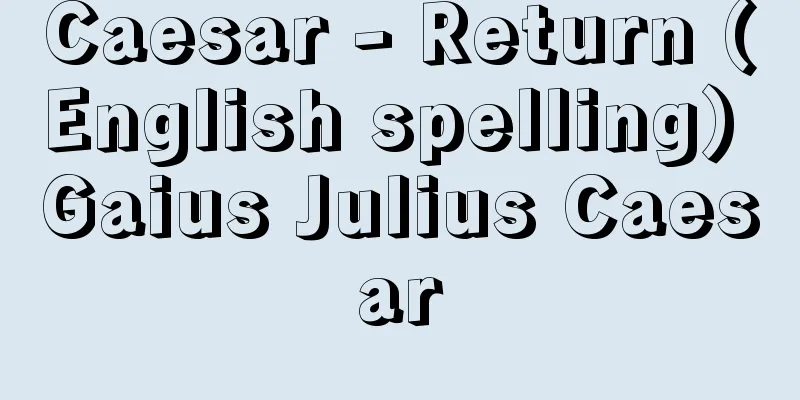Caesar - Return (English spelling) Gaius Julius Caesar

|
A Roman politician and general in the final days of the Republic. One of the politicians who established the so-called First Triumvirate. In English, he was known as Caesar. He pacified Gaul and spread the culture of classical antiquity to the interior of Europe, and as a result of his victory in the civil war, he became the sole ruler and carried out social and political reforms with a view to becoming a world empire, but he was assassinated for being seen as trampling on the traditions of the Roman Republic. A great politician who decisively changed the history of Greece and Rome, he is also considered a first-class general and man of letters. [Hasegawa Hirotaka] The Road to ConsulCaesar was born on July 13, 100 BC. He was from a patrician family that boasted of being descendants of the goddess Venus (although the Caesar family was not one of the most prestigious families, and had no notable ancestors). His aunt was the wife of General Marius. His father was Gaius Julius Caesar. Although he lost his father in 85 BC, he continued to devote his life to his mother Aurelia, who was known as a good wife and mother. In 84 BC, he married Cornelia, the daughter of Cinna, a popular supporter, and after the victory of Sulla, a factionist, he was urged to separate from her, but he refused and went to the East to escape persecution. He served in the provinces of Asia and Cilicia from 80 BC to 78 BC, and was awarded the oak leaf crown for his military achievements. After Sulla's death, he returned to Italy and in 77 BC, he took his first steps in political life by accusing the former provincial governor Dolabella. He then studied oratory under Molon of Rhodes from 75 to 74 BC, and was ordained a priest in 73 BC. From 70 BC onwards, while he was keen to become the leading figure, he also began to walk the path of a populist who aimed to overthrow the Sultanate. In 69 BC, he was appointed as a quaestor in "Far Spain" (Hispania ulterior) (until 68 BC), and from 67 to 64 BC, he made his position clear as a supporter of Pompey. After being elected aedile (censor) in 65 BC, he organized large-scale gladiatorial contests to win over the people. Furthermore, he was made high priest (for life) in 63 BC through large-scale bribery. There is some debate as to whether he participated in Catiline's conspiracy to overthrow the state, but he opposed Cicero's strong-arm measures. In 62 BC, he became a praetor, and supported various bills for Pompey, who had returned from the East. In December, he divorced his wife in connection with a scandal involving Clodius and his wife Pompeia (granddaughter of Sulla, whom he remarried in 67 BC after losing Cornelia). He then borrowed a large amount of money from Crassus to escape his debtors, and in 61 BC, he was appointed governor of "Distant Spain." He restored order in the province, defeated the Lusitanians, and enriched his subordinates and the national treasury with the spoils of war, building up political and military power. In 60 BC, he formed an alliance with the powerful Pompey and the wealthy Crassus, and started the first Triumvirate, a private union. With this as a backdrop, he was elected consul (translated as governor or governor), the highest office in the Roman Republic, in 59 BC. As consul, he strengthened his ties with Pompey and Crassus and won the will of the people by passing two bills aimed at allocating land to Pompey's veterans and the propertyless, Pompey's laws in the East, bills to approve orders, bills to collect taxes, bills to combat illegal acquisitions, bills on the king of Alexandria, and bills to open the Senate to the public. On the other hand, he himself, by a bill, was allowed to rule Gallia Cisalpina (Gallia on this side of the Alps) and Illyricum (the region of modern Croatia facing the Adriatic Sea and western Hungary) until the end of February 54 BC, and to this he also granted Gallia Transalpina (Gallia beyond the Alps). He also married Calpurnia, the daughter of the consul Piso, and gave his daughter Julia to Pompey. His performance as consul has been described as being similar to that of a tribune. [Hasegawa Hirotaka] Gallic WarsDuring his term as governor of Gaul from 58 BC to 50 BC, he waged the Gallic Wars and pacified almost all of Gaul up to the left bank of the Rhine. First, in 58 BC, he defeated the Helvetians, then the Germanic Ariovistus, and in the following year, 57 BC, he subjugated the Belgae in northern Gaul, and in 56 BC, he marched from Brittany and Normandy to Aquitania, where he also defeated the Veneti. In 55 BC, he crossed the Rhine, entered Germanic land, and also invaded Britain. In July 54 BC, he again marched to Britain, but in the autumn he dealt with a major Gallic rebellion, and in 53 BC, he defeated the tribes of northern Gaul, especially the Treveri and Eburones. During this time, he continued to pay close attention to the political movements of central Rome. The alliance between Pompey and Crassus was solidified at the meeting of Luke in April 56 BC, and Caesar's position as governor of Gaul was extended by five years, but his relationship with the conservative faction of the Senate deteriorated. In 52 BC, Caesar fought against the Gallic uprising led by Vercingetorix (c. 82 BC-46 BC), and won the siege of Alesia after the battles of Aualicum and Gergovia. The following year, there were battles such as the Beroucian uprising, but the fighting in Gallo came to an end. The long-running Gallic Wars not only enriched the Roman treasury, but also increased Caesar's economic and political power, and in particular fostered a broader perspective that went beyond the city-state of Rome, laying the foundation for a military dictatorship. Meanwhile, the interior of Europe was blessed with the blessings of Greek and Roman culture for the first time, and it can be said that the foundation for the establishment of the Western European cultural sphere was laid. [Hasegawa Hirotaka] Civil WarThe death of Pompey's daughter Julia in 54 BC, and the death of Crassus in 53 BC during the Parthian campaign led to the collapse of the First Triumvirate, and the relationship with Pompey, who was forming an alliance with the conservative faction of the senate, also deteriorated. Since 51 BC, the situation had been getting increasingly tense over the recall of Caesar and the disbanding of the army, and a compromise plan was rejected. In response to the final resolution of the senate on January 7, 49 BC (declaration of a state of emergency), Caesar led his troops across the Rubicon River and invaded Italy, starting a civil war with the conservative faction of the senate that had given Pompey full powers. After Caesar's conquest of Italy, Pompey fled to the east, so Caesar seized his province of Spain, his home base, and then pursued Pompey to Epirus in 48 BC, where he defeated him in the decisive battle of Pharsalus on August 9 after a battle at Dyrrachium. He then went to Egypt, where he became embroiled in the war for the throne (October 48 BC - March 47 BC), and had a son, Caesarion, with Cleopatra, who won the battle and became queen. Later, in August 47 BC, he killed Pharnaces, the son of Mithridates the Great, at Zela, and restored order in Asia Minor. He then defeated the remaining troops of Pompey, led by Scipio, at Thapsus in Africa (April 6, 46 BC), and forced Cato the Younger to commit suicide in Utica. He then defeated the army led by Pompey's son at Munda in Spain on March 17, 45 BC, putting an end to the civil war. [Hasegawa Hirotaka] DictatorAt the end of 48 BC, he was appointed dictator for a one-year term, and after the victory of Thapsus, he was appointed dictator for ten years around April 46 BC, and then for life from February 44 BC, and was given many honors and privileges. He was granted the privileges of commanding the entire military, managing the national treasury, deciding on peace or war, enforcing public morals, and recommending elections, and was granted the honor of always wearing the costume of a triumphal general (the clothing of an ancient Roman king), and statues of him were erected in various temples. On the other hand, he showed mercy towards his political opponents, granting large-scale amnesties and promoting them to higher positions. While he welcomed the will of the people with a great triumph, spectacles, and games, he also promoted large-scale projects such as poverty relief, land distribution within Italy, and colonization of Carthage and Corinth, granted Roman citizenship to the Latin cities of Gaul north of the Po River and south of the Alps, increased the number of seats in the senate and appointed people from a wider range of backgrounds, and carried out large-scale civil engineering works to improve the capital, Rome, adopted the solar calendar (Julian calendar) on January 1, 45 BC, and established laws setting out the standards for autonomous cities. However, because he concentrated power in his own hands, he was assassinated in the senate hall on March 15, 44 BC by Brutus, Cassius, and other defenders of the republic. [Hasegawa Hirotaka] PublicationsHe was known as a first-class orator and man of letters, but his manuscripts of speeches, letters, and pamphlets have been lost, and all that remains are his "Commentaries on the Gallic War" (8 volumes, although the 8th volume was written by a subordinate) and "Descriptions of the Civil War" (3 volumes), which are considered models of Latin prose in terms of their concise writing style and accurate grasp of reality. [Hasegawa Hirotaka] evaluationHe was not only a hero in battle, but also a talented general. He was also a popular politician who accurately grasped the public's heart and carried out various reforms, but he collapsed before he had completed his work. As a person, he had a cool head, but was also passionate, trampled on traditional customs, and was loose with money, but he was also full of humanity. He was convinced that he was with the goddess of fate, and was seen by the public as a child of fate, but he is also known as a compassionate man who wholeheartedly accepted his political opponents. There is a conflict between those who see him as a destroyer of the republic and those who see him as a person who laid the foundation stone of the empire, and his evaluation is not settled, considering whether his ultimate aim was the monarchy. There has also been a historical conflict in academic theory regarding the scale of his politician, especially his vision of a world empire. His character, including his rich humanity and the tragic end, has been taken up from various angles by Shakespeare and other literary scholars and artists up to the present day. Caesar was originally the name of a family of the Julian clan (until Emperor Caligula), but it became the title of the Roman Emperor (head of state), and after Emperor Hadrian it also became the title of the heir to the throne. Furthermore, during the Dominatus period it referred to a co-emperor, but later it became Kaiser in Germany and Tsar in Russia, each of which came to mean the emperor of an empire. [Hasegawa Hirotaka] "Caesar's Writings: The Gallic Wars and the Civil War, translated by Kunihara Yoshinosuke (1981, Chikuma Shobo)" ▽ "The Gallic Wars, translated by Chikayama Kinji (Iwanami Bunko)" ▽ "Plutarch's Lives, translated by Kono Yoichi (Iwanami Bunko)" ▽ "World Classical Literature Series 23: Plutarch, edited and translated by Murakawa Kentaro (1966, Chikuma Shobo)" ▽ "Caesar, by Rimbaud, translated by Terasawa Seitetsu (Hakusuisha, Que sais-jes Bunko)" ▽ "Julius Caesar, by Walter, translated by Tachibana Seiji (Kadokawa Bunko)" ▽ "Caesar, by Gelzer, translated by Hasegawa Hirotaka (1968, Chikuma Shobo)" ▽ "World Biography Series 3: Julius Caesar, by Pierre Grimard and others, supervised and translated by Hasegawa Hirotaka and others (1984, Shogakukan)" [References] | |Source: Shogakukan Encyclopedia Nipponica About Encyclopedia Nipponica Information | Legend |
|
古代ローマ、共和政末期の政治家、将軍。いわゆる第1回三頭政治を敷いた政治家の一人。英語ではシーザー。ガリアを平定して、古典古代の文化をヨーロッパ内陸部にまで広めるとともに、内乱での勝利の結果、単独支配者となり、世界帝国的な視野のもとで社会的、政治的な変革を行ったが、共和政ローマの伝統を踏みにじるものとみなされて暗殺された。ギリシア・ローマの歴史を決定的に変えた大政治家であり、将軍、文人としても第一級の人物とみられている。 [長谷川博隆] コンスルへの道カエサルは紀元前100年7月13日に生まれた。女神ウェヌス(ビーナス)の後裔(こうえい)であることを誇るパトリキ系の名門の出である(ただしカエサル家は第一級の名門には属さず、祖先にも名士を出していない)。伯母は将軍マリウスの妻。父はガイウス・ユリウス・カエサル。前85年に父を失ったが、良妻賢母の誉れの高い母アウレリアには一生敬愛の念を捧(ささ)げた。前84年に民衆派のキンナの娘コルネリアをめとったため、閥族派のスラの勝利後、離別を促されたが、受け入れず、追及を逃れて東方に赴き、前80~前78年属州アジアおよびキリキアで従軍し、武勲のため檞(かしわ)葉の冠を受けた。スラの死後帰国し、前77年、元地方長官ドラベラを告発することによって政治生活の第一歩を踏み出した。ついで前75~前74年ロードス島のモロンのもとで雄弁術を学び、前73年には神官に選ばれた。前70年以降は、第一人者たろうという功名心を燃やしつつ、スラ体制の打破を目ざす民衆派の一人としての道を歩み始めた。前69年には財務官として「彼方(かなた)のスペイン」(ヒスパニア・ウルテリオールHispania ulterior)に赴任し(~前68年)、前67~前64年にはポンペイウス支持の立場を鮮明にし、前65年のアエディリス(按察官(あんさつかん))に選ばれるや、大々的に剣闘士競技を催して、人心収攬(しゅうらん)に努めた。さらには大規模な買収によって前63年大神官(終身)になった。なお、国家転覆を謀るカティリナの陰謀事件に加担したかどうかについては議論があるが、キケロの強硬処置には反対している。前62年法務官となり、東方から帰国したポンペイウスのための各種の法案を支持し、12月のクロディウスと妻ポンペイア(スラの孫娘。コルネリアを失ったのち、前67年に再婚した女性)とのスキャンダル事件に関連して、翌年妻を離別した。ついでクラッススから多額の借金をして債鬼を逃れ、前61年「彼方のスペイン」の長官として任地に赴くや、属州の秩序を整え、ルシタニ人を討ち、戦利品で部下および国庫を潤し、政治的、軍事的に力を蓄えてゆく。前60年には、実力者ポンペイウス、富豪クラッススと同盟を結び、私的な結合たる第1回三頭政治を始め、これを背景に前59年共和政ローマの最高の官職コンスル(執政官または統領と訳す)に選ばれた。 コンスルとしては、ポンペイウスの老兵および無産市民に対する土地割当てをねらいとする2回にわたる国有地分配法案、ポンペイウスの東方での諸規定、秩序を認める法案、徴税請負法案、不法取得取締法案、さらにはアレクサンドリアの王に関する法案や元老院議事公開法案などを通すことによって、ポンペイウスやクラッススとの結び付きを固めるとともに、一般民衆の意を迎えた。一方、自らも一法案により、コンスル職ののち、ガリア・キサルピナGallia Cisalpina(アルプスの此方(こなた)のガリアの意)とイリリクム(現在のクロアチアのアドリア海に面する地方およびハンガリー西部)を前54年2月末まで統治することが認められ、さらにガリア・トランサルピナGallia Transalpina(アルプスの彼方のガリア)がこれに付け加えられた。また自分は執政官ピソの娘カルプルニアを妻とし、娘ユリアをポンペイウスにめあわせている。そのコンスル職の活躍は、護民官的なものであったと評されている。 [長谷川博隆] ガリア戦争前58年からガリアの地方長官として前50年までの在任中にガリア戦争を遂行し、ライン川左岸までのガリア全土をほぼ平定した。まず前58年にはヘルベティア人を討ち、さらにゲルマン人のアリオウィストゥスを破り、翌前57年にはガリア北部のベルガエ人を抑え、さらに前56年にはブルターニュ、ノルマンディーからアクィタニアに兵を進め、ウェネティ人も下した。ついで前55年にはライン川を越えてゲルマン人の地に入り、またブリテン島にも遠征している。さらに前54年7月、再度ブリテン島に兵を進めたが、秋にはガリアの大反乱に対処し、ついで前53年には北ガリアの諸部族、とくにトレウェリ人、エブロネス人を討った。その間も中央ローマの政治の動きに心を配り続けた。ポンペイウスとクラッススとの盟約は前56年4月のルカの会談で固められ、カエサルのガリアの地方長官職も5年延長されたが、一方、元老院の保守派との関係は悪化してゆく。前52年のウェルキンゲトリクスVercingetorix(前82ころ―前46)に率いられたガリアの大蜂起(ほうき)に対しては、アウァリクム、ゲルゴウィアの戦闘後、アレシアの包囲戦で勝利を収めた。翌年もベロウァキ人の蜂起などの戦闘はみられたが、いちおうガリアの戦いには終止符が打たれた。長年にわたるガリア戦争はローマの国庫を潤したばかりか、カエサルの経済的、政治的な力を増大させ、とくに都市国家ローマにとどまらない広い視野が培われるとともに、軍事独裁のための基盤がつくられた。一方、ヨーロッパ内陸部が初めてギリシア・ローマ文化の恵みに浴し、西欧文化圏成立の基礎がつくられたといえよう。 [長谷川博隆] 内乱ポンペイウスに嫁した娘ユリアが前54年に死に、翌前53年にクラッススが東方パルティア遠征で敗死したため、第1回三頭政治も崩壊し、元老院の保守派と結んでゆくポンペイウスとの関係も悪化する。前51年来カエサルの召還、軍隊解散をめぐって事態は険悪の一途をたどり、妥協案も退けられ、前49年1月7日の元老院の最終決議(非常事態宣言)に対して、カエサルは兵を率いルビコン川を渡ってイタリアに侵入し、ポンペイウスに全権を与えた元老院の保守派との内乱に突入した。カエサルのイタリア制圧によりポンペイウスが東方に逃れたため、カエサルは彼の地盤の属州スペインを抑えたのち、前48年、エピルスの地にポンペイウスを追い、デュラキウムでの陣地戦のすえ、8月9日ファルサロスの決戦でこれを破った。ついでエジプトに渡ったが、王位継承戦(前48年10月~前47年3月)に巻き込まれ、戦いに勝って王位につけたクレオパトラとの間に一子カエサリオンをもうけた。その後、前47年8月にはミトリダテス大王の息子ファルナケスをゼラで討ち、小アジアの治安を整えた。ついでアフリカでスキピオの率いるポンペイウスの残兵をタプススに破り(前46年4月6日)、小カトーをウティカに自刃させた。さらに前45年3月17日にはスペインのムンダでポンペイウスの息子の率いる軍勢を破って、内乱に終止符を打った。 [長谷川博隆] 独裁者前48年末に1年任期の独裁官に任ぜられ、またタプススの勝利後、前46年4月ごろ10年任期の、さらに前44年2月以降は終身の独裁官になり、数多くの栄誉や特権が与えられてゆく。全軍に対する指揮権、国庫の管理、和戦の決定、風紀取締り、推薦選挙などの特権、凱旋(がいせん)将軍の衣装(古ローマの王の衣服)の常時着用の栄誉が認められ、諸神殿に彼の彫像が立てられる。一方、政敵には寛大な姿勢を示し、大規模な恩赦を与え、これを登用してゆく。大凱旋式および見せ物、競技で民衆の意を迎える一方、大々的に救貧、イタリア内の土地分配、カルタゴやコリントへの植民などの事業を進め、ポー川以北、アルプス以南のガリアのラテン市にローマ市民権を与え、元老院の議席を増やして広い層の人を登用し、また大規模な土木工事をおこして首都ローマを整え、前45年1月1日からは太陽暦(ユリウス暦)を採用し、自治市の規準を示す法律も定めた。しかし権力を一身に集中したため、前44年3月15日、ブルートゥス、カッシウスら共和政護持者たちに元老院議場で暗殺された。 [長谷川博隆] 著作雄弁家、文人としても第一級の人物として知られる。しかし、その演説の草稿、書簡、パンフレットは散逸し、現存するのは、簡潔な文体、的確な現実把握の点でラテン散文の範といわれる『ガリア戦記』(8巻。ただし第8巻は部将の手に成る)、『内乱誌』(3巻)のみである。 [長谷川博隆] 評価実戦の雄であるばかりか、将軍として卓越した才能を示し、一方、人心の向かうところを正しくつかんだ民衆派政治家で、各種の改革を遂行したが、業なかばで倒れたというべきであろう。人間的には、冷静な頭脳をもっていた一方、情熱的で、在来の習慣を踏みにじり金銭関係もルーズであったが、人間味豊かであった。運命の女神とともにあることを確信し、世人からも運命の申し子とみなされた一方、政敵を心から受け入れる仁慈の人として知られる。究極のねらいは王政であったのかという点を踏まえ、彼を共和政の破壊者とみる説と、逆に帝政の礎石を据えた人物とする説との対立があり、評価は定まらない。政治家としてのスケールの点、とくに世界帝国的な視野の点についても学説史上対立がある。豊かな人間性、最後の悲劇性など、その人間像についても、シェークスピアをはじめ文学者、芸術家の手で、現代までさまざまの角度から取り上げられている。 なお、カエサルとは本来ユリウス氏族の一家族名であったが(カリグラ帝まで)、ローマ皇帝(元首)の称号となり、ハドリアヌス帝以降は帝位継承者の称号ともなった。さらにドミナトゥス時代には副帝をさしていたが、のちドイツではカイザー(カイゼル)、ロシアではツァーリとなり、それぞれ帝国の皇帝を意味する名称となった。 [長谷川博隆] 『国原吉之助訳『カエサル文集 ガリア戦記・内乱記』(1981・筑摩書房)』▽『近山金次訳『ガリア戦記』(岩波文庫)』▽『河野与一訳『プルターク英雄伝』(岩波文庫)』▽『村川堅太郎編・訳『世界古典文学大系23 プルタルコス』(1966・筑摩書房)』▽『ランボー著、寺沢精哲訳『シーザー』(白水社・文庫クセジュ)』▽『ヴァルテル著、橘西路訳『ジュリアス・シーザー』(角川文庫)』▽『ゲルツァー著、長谷川博隆訳『カエサル』(1968・筑摩書房)』▽『ピエール・グリマール他著、長谷川博隆監修・他訳『世界伝記双書3 ユリウス・カエサル』(1984・小学館)』 [参照項目] | |出典 小学館 日本大百科全書(ニッポニカ)日本大百科全書(ニッポニカ)について 情報 | 凡例 |
Recommend
Women's Christian Temperance Union
A Christian women's organization that originat...
Fion
...The Danaan Giants (another name for the race o...
Paradise Nuts (English spelling)
The seeds of several species of the genus Lecythis...
Independence Association (English: Tokrip hyǒphoe)
A political organization that launched a mass move...
Inagawa River
A river that flows through the southeastern part ...
Kushira [town] - Kushira
An old town in the middle of the Osumi Peninsula, ...
Urayama - Envy
〘Noun〙① Seaside and mountains. Sea and mountain. ※...
Mechanical damage
...In electrical equipment, the power and motive ...
Balakirev
Russian composer, pianist, and conductor. Also kno...
Red Spotted Butterfly - Red Spotted Butterfly
...Females lay eggs in columns on the undersides ...
Kyoto National Museum
This museum is located in Chayamachi (Higashiyama...
Julianus
…After the fall of Rome to the Visigoths in 410, ...
Tarbagan
…Also known as Tarbahan or Tarbagan. A rodent mam...
Kampong Cham (English spelling)
Kompong Cham. A city in south-central Cambodia. It...
Iida Sekien
...A scholar of Japanese classics and a poet of t...









